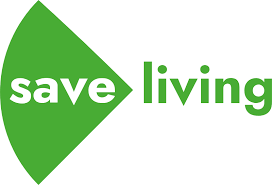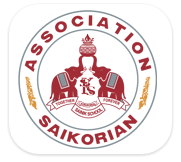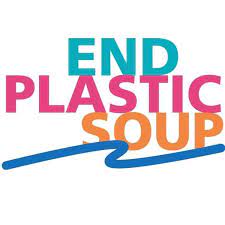A Plastic Recycle Factory
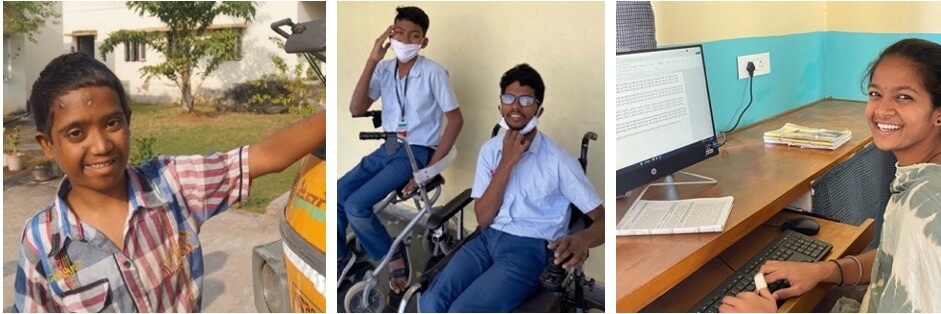

A vocational training for youth with disability to become plastic recycle operator
Projectplan Rotary Global Grant 2238142
Total costs $ 160.000
SUMMARY 21.08.23
A vocationial training program
for youth with a disability to become
PLASTIC RECYCLE OPERATOR
A PLASTIC RECYCLE FACTORY
for 8 villages, Pusapatirega Mandal, Andhra Pradesh, India
Two Areas of Focus
- Economic and community development
- Conservation of the environment
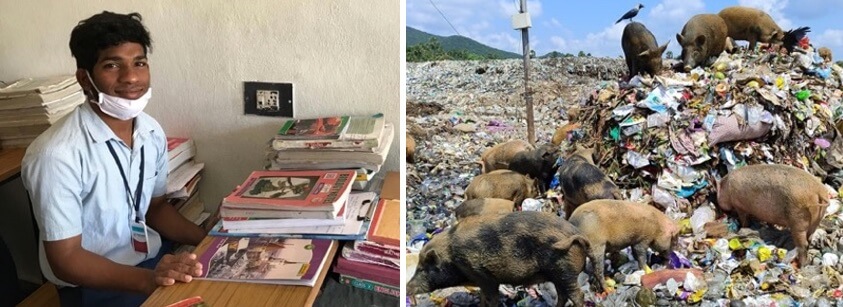
Chapter 1 Vocational training plastic recycle operator
1.1. Introduction
Youth with a disability at the remote fisher villages of India has hardly a chance to find an education and a job. At the same time, the fishing villages and beaches on India’s east coast are slowly but surely becoming suffocated by a thick layer of mixed plastics. The plan is:
- a vocational training for disabled youth to become a trained plastic recycle operator
- a factory to recycle low-worthy plastic foils into useful outdoor products: tiles and planks
- 3 different awareness trainings regarding the environment for 8 villages during 3 years
1.2. Location: at Campus Challenge
The loation Campus Challenge, a regional facility for children and youngsters, constructed at the request of the villagers in 2008-2009 by Friends Indeed Foundation Netherlands . Local artner is the Association Saikorian. The Campus takes care of 150 children and youngsters intern and 850 children extern.
There is a children village with 150 seats, an English Medium School class 1- 10. Special education, ambulant team, physiotherapy, orthopedic workshop etc. The available building at Campus Challenge. at Konnada Junction, Poosapatirega Mandal, Vizianagaram District, AP, India, is very suitable.
1.3. The vocational training to become plastic recycle operator
At Campus, there already 5 vocational trainings: secretary, horticulture, stitching center, printshop, maintenance. This 6th training – for recycle plastic operator – will be embedded in the existing structure.
Approximately 6 -8 youngsters will have seat per training. Basis for the selection of the students is the list of current and former students of Campus Challenge 2009 – 2023. . The youngsters know already about this program since the visit of the assessment team in February 2023. They look forward to start the work, produce the tiles and planks and see the possibilities of the material. F.i. they asked whether they can also make own designs (f.i tables, benches, small cupboards, compost bins, flowerpots etc.)
Also the secretary education looks forward because the factory will need its own office, which means the youngsters of the secretary education can work there as a trainee for the phone, taking orders, marketing, arrange transport, making the bills etc.
1.4 Training modules
The training will be divided in 3 parts:
- Training in the Netherlands for 3 people (train the trainers) 7 – 10 days
- Training on the spot when the machines arrive and are installed 14 – 21 days
- Training of one year to become operator
The training will be jointly developed by Save Living and the staff of Campus Challenge and ends with a certificate, conform the guidelines of Save Living and the Indian Guidelines for vocational trainings.
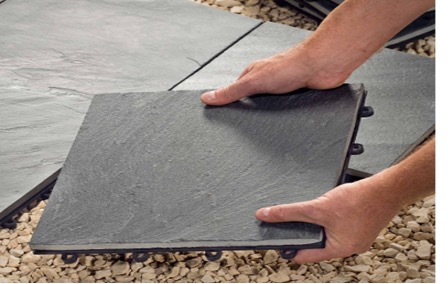
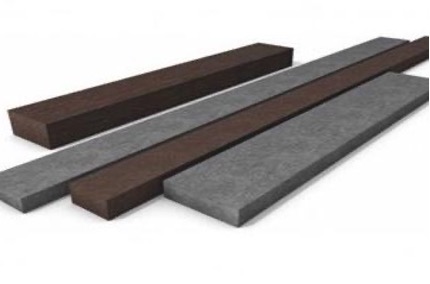
Examples of the raw material, foils and of the rsults: planks and tiles!
1.5 Target group vocational training
The numbers of handicapped youth in Pusapatirega Mandal alone are:
• Male, handicapped, age 18 – 25 132
• Female, handicapped, age 18 – 25 119
It will be made a point to see to it that the number of male and female participants in the program – in the factory and in the villages – is the same.
The target group to get this education is:
- Youth with disability living at Campus Challenge, or having followed a training at Campus 2009 – 2023, age 18 – 25, who will be trained to become plastic recycle operator, to make construction material .
- Youth with disability living in 8 neighboring villages who will assist in gathering the right plastics foils and have them transported to the factory
2. The plastic recycling factory
The plan is to set up a local factory in partnership with the Save Living Foundation The Netherlands:
- to bring the European knowledge about this subject to this area
- to start up the education as plastic recycle operator
- to construct the factory and get it up and running
- to use law worthy plastics as raw material, coming from fisher villages
- make construction material out of it: planks and tiles
The plastic recycling factory, technique designed by Save Plastic, offers a unique solution for plastics which are difficult to process: the lowgrade mix and foil plastics. This concerns about half of the plastic waste in India. Save Plastics will advise and arrange the estimate for the machines for two production lines:
- Tiles 30 x 60 cm and 60 by 60 cm
- Planks 200 x 20 x 3 cm.
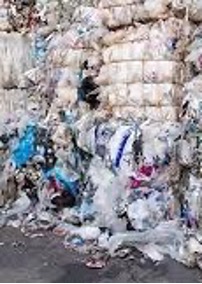
Mixed Foils
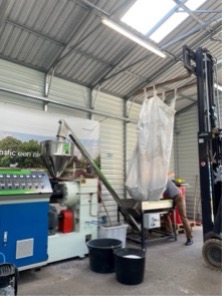
Extrusion
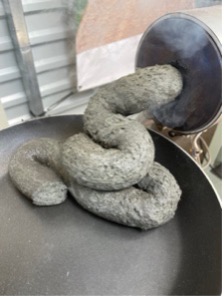
Mix
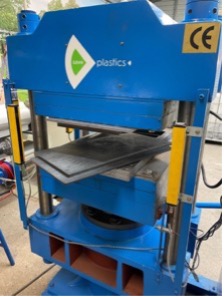
Press
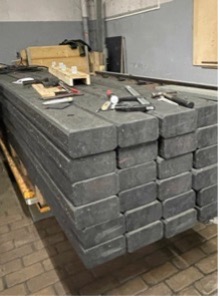
Planks!
There is no need to wash the foils. Great advantage is that recently Campus Challenge got a total solar package, donated by an Indian donor, with a surplus capacity for the factory. The technical staff of Save Plastics will be in India to construct the factory and give service during 3 years, on the spot and using online support with zoom. The staff of Campus Challenge will provide the management and guide the youngsters who get a training to become a plastic operator.
3. Rotary community assessment and environment assessment
Conform the Rotary Foundation regulations, an February 2023, an assessment of a week took place by a team of 8 members from RC Vizianagaram, RC Amsterdam-Nieuwendam, Save Plastics, Campus Challenge and Friends Indeed. The team:
- visited the current 5 vocational trainings for youngsters with a disability to get an impression whether a 6th vocational training to become a plastic recycle operator would be realistic and could be imbedded
- followed the plastic waste till from the moment it hits the street: streams, open sewers, the beach, side roads, till dumps, where it was mainly burned
Regarding the future education and the route of the plastic there were discussions at all levels to inventarise the current situation and needs. Also it was investigated what plastic recycle products could be useful and whether the raw material (foils), technical knowledge, maintenance is available etc. Please see the assessment report.
4. Business case plastic recycle factory
Based on the experiences during the assessment, a 5 years business case has been written for three products, 2 tiles with different size and 1 plank. The costs have been compared with ceramic tiles and wooden planks, available in the nearby town.
The 1st year starts with only material costs, the 2nd year brings in salary costs, the 3rd year depreciation. The production output in the 1st year is 22.800 kg and will rise to 33.280 kg, based on 1 shift of 8 hours per day, 260 days. Starting in the 3rd year, the moment that depreciation enters, more production via extra shifts is needed. There are no additional electricy cost and no costs for the building. Also the youngsters in education get no salary but free boarding and food at Campus.
The business case shows the plastic tiles can be produced against the same or lower costs that ceramic tiles and wooden planks. It is also important to realise that the life time of a plastic tile or plank is 45 years, and than it can be melted again and used 9 times. This means that the plastic products are more sustainable.
5. Three Education programs at 8 villages to promote behaviors for conservation of the environment
To make this program a success, it is necessary to create awareness in the villages concerning the conservation of the environment. Therefore, three trainings will be given during 3 years:
a. School education
There is an education pack for age group 11-12, developed with the financial support of Transform CE. Europe. This program will be given 3 years on a row, including a ‘plastic hunt’, visit to the factoryand the preparation of a Children Conference after 3 years.
b. Village awareness program
The same – adapted – program will be given for adults. This includes also plastic hunt, but now with a shovel to clean the environment of the villages, experience melting plastics using a mobile LAB, visit the factory and making school gardens at the cleaned areas.
c. ‘Hero’ Program
Youngsters with a disability, who live in the villages and have no job, become the central persons in their villages to gather the foils, store them and send them once a week with the drivers of the schoolbus of Campus or the ambulance. They get paid per kg, the same price which will be paid for the pressed bulks of the sorting centers. In that way, the youngsters have a small job, can participate, can contribute to the family income, which is very important for their self esteem.
The three trainings come together after 3 years in a Children Conference, to be organised at Campus Challenge, to be prepared by the children and their parents, presenting what they learned and experienced with interviews, movies, powerpoints etc. Also, this will be an excellent moment to give prices to schools, villages, children to appreciate their efforts.
6. Project Implementation
To reach all goals, including the education program, it is important that all partners stay three years closely involved. This means: regular visits of the partners to give technical support, monitor, see to the proper maintenance and give the mentioned trainings at the schools and in the villages.
Association Saikorian and partner Friends Indeed will guarantee during three years:
• The location inclusive renovation
• The maintenance and repairs
• The annual costs:the salarie, energy costs, transportation costs, free boarding youngsters
• Monitoring and evaluating conform the regulations of the Rotary Foundation
7. The Partners: a strong team
RC Amsterdam-Nieuwendam Netherlands
Club members and guests of RC Amsterdam-Nieuwendam visited the fisher villages many times and wondered whether it would be possible to transfer the thick layers of plastic into construction materials for the same villages. Think of : tiles for a toilet, a kitchen, a floor, planks for housing, roofs, shoring material!
Contact person:
Anne Legeland, 00 31 6 549 23 887
Mail:
dg2015-2016@rotary-d1580.nl
plasticrecyclelab@rotary.nl
Website:
www.plasticrecyclelab.nl
RC Vizianagaram India
RC Vizianagaram is quite near the fisher villages and aware of the problems over there. Also, RC Vizianagaram has a lot of experience in running Global Grants.
Contact person:
Dr. Venkateswara Rao, IDG 2024-2025 D 3020
Phone: 00 91 770 26 12346
Mail: drmvrao3020@gmail.com
Foundation Save Living Netherlands
The Save Living Foundation is the NGO of Save Plastics BV, who found a solution to transform low worthy mixed plastics (foils) into construction materials. With a European Interreg subsidy they built the first factory at Almere, The Netherlands, which transfers per year 2.500.000 kg of raw plastic into construction materials. Founders Bram Peters and Marlous de Bordes have many years experience to pave this circular path .
Contact person: Marlous de Bordes
Telefoon 00 31 66 53 14 96 87
Mail marlousdebordes@gmailcom
Website www.saveplastics.nl
Association Saikorian
Campus Challenge for children and youngsters with a disability, India
Campus Challenge is a regional facility for 1000 children and youngsters with a disability with a children village with 10 homes, a EMS school 10 classes, outreach team, 5 vocational trainings, big gardens. There is a separate building available. Campus has the technical knowledge to run and maintain a recycle factory.
Contact person R.L.N. Sharma, director
Phone 00 91 93 94 33 36 15
Website www.campus-challenge.org
Friends Indeed Foundation Netherlands
This Dutch NGO, working and constructing in India since 2004, under which 24 schools and Campus Challenge, will guarantee the costs which cannot be funded via the Global Grant. Also, Friends Indeed will guarantee the salary costs and monitoring during 3 years to make the program sustainable.
Contact person Anne Legeland
Website www.friendsindeed.nl
Collaboration Rotary End PlasticSoup
This program has the support of the Rotary EndPlasticSoup initiative, a network of hundreds of Rotary, Rotaract and Interact clubs worldwide to solve the plastic pollution problem. Their goal: by 2050 no more plastic soup in oceans, seas, lakes, rivers, parks and streets!
See: endplasticsoup.org
8. Budget
9. Financial plan
It is with great pleasure that both clubs announce that per August 2023 the commitment for the total amount of $ 160.000 has been reached. This program is a joint collaboration of:
• The Netherlands 10 clubs
• India 1 club
• Belgium 1 club
• England 1 club
• USA 3 clubs
• Districts 6 districts
10. Timeline
a. Preparation grant 2022-2023
b. Assessment on the spot February 2023
c. Fundraising April/July 2023
d. Filing the application August 2023
e. Decision TRF September 2023
f. Ordering machines September 2023
g. Installation November 2023 – Februari 2024
11. Conclusion
To start a vocational training for youngsters with a disability to be become plastic recycle operator, located at a advanced plastic recycle factory serves a Dutch saying: “two birds with one stone”. Via this program a vulnerable group of youngsters get a chance: they will have a very advanced education at a very modern factory.
Our generation embraced plastic rather naively. We now are wiser and more aware of the risks and possibilities. Since there is worldwide an enormous heap, which heap unfortunately will still grow, till 2050, we better use plastic as a raw material, become circular and for the sake of conservation of the environment, our health, the health of our children and their children.
And once the vocationa training starts, the factory is up and running and the programs in the villages are in place: please visit us and have a look!
A vocational traing for youngsters with a disability
A a plastic recycling factory
Conservation of the environment
Join us, learn with us, and visit the factory in 2024!


